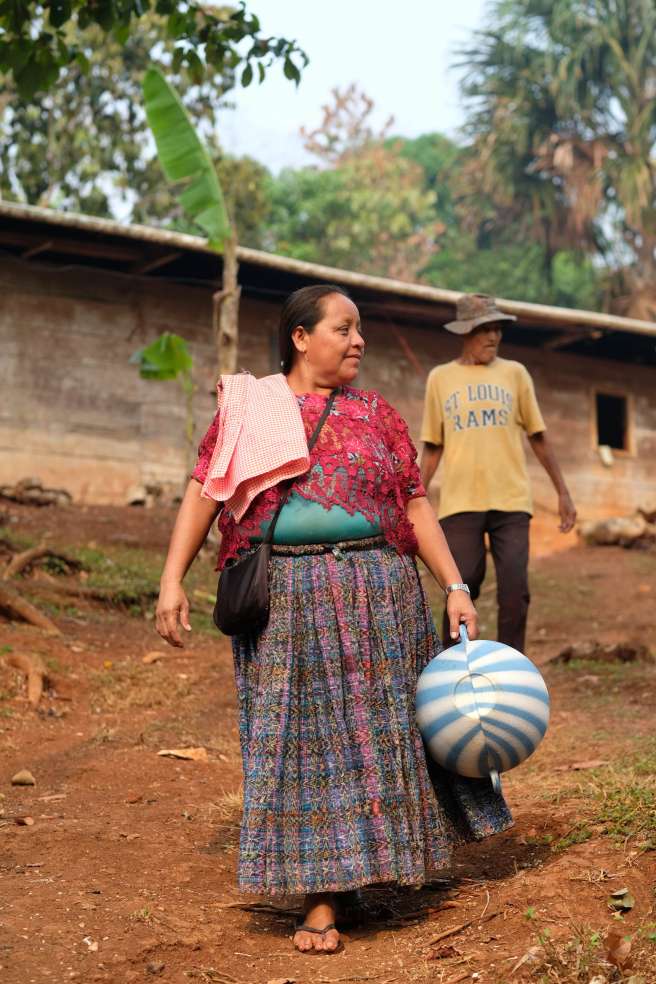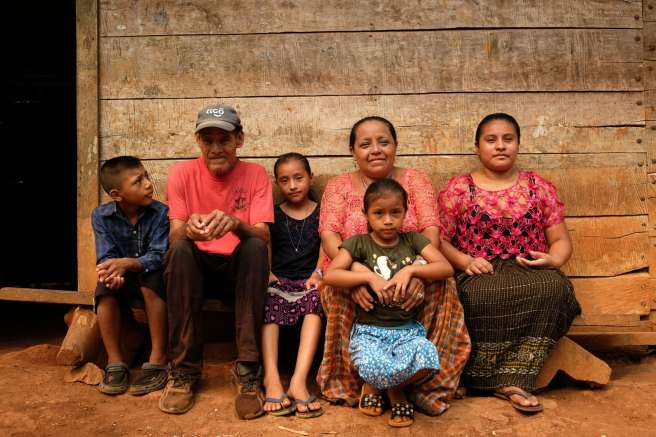'Climate change has been killing our crops, and this is our food'
Meet Aurelia
An inspirational farmer and community leader. Aurelia and her family belong to the Indigenous Q’eqchi’ community of the Alta Verapaz region.
The climate crisis and industrial plantations have changed Q’eqchi’ land dramatically. Gruelling heatwaves, savage storms and unpredictable seasons are ravaging farms. Industrial agriculture is taking over the last of the region’s natural resources to feed the world’s richest countries.
Many of the vital crops that Aurelia depends on are withering and dying before her eyes.
Please help fund vital tools and training, so farmers like Aurelia can support their community to escape hunger.
Family life
I came to this community when I was 25 years old, I’m 78 now. This was a forest with different types of trees. You could really feel the freshness of the environment while walking through the mountains, under the shade of these trees.
Image credits and information

See our Christian Aid Week 2025 worship resources and pray that we can fight the effects of the climate crisis in communities like Aurelia’s.
Image credits and information

It’s a heartbreaking injustice that a community should be threatened by a climate crisis they didn’t cause. Aurelia, along with the women and girls of her community, has the twice-daily challenge of collecting water from a cenote – a natural sinkhole like a cave, with water at the bottom.
Climate change is getting worse every day. It’s killing our plantations and it’s killing us.
Will you make a gift that supports a farmer like Aurelia to protect their grandchildren from malnutrition?
Climate and farming
Aurelia’s farm, first and foremost, feeds her family.
She tries to grow a range of crops so she can provide them with a balanced diet that contains the vitamins and minerals they need to thrive. In this way, Aurelia can protect her loved ones from malnutrition and ill health. But as increasingly intense conditions kill her crops, Aurelia’s ability to safeguard her family slips away.
Aurelia’s observed many impacts of the climate crisis, including extended dry seasons, the degradation of soil, contaminated water and a decreasing diversity of plants and crops.
There was a prediction this would happen in the future, but it has come earlier. This is very worrying for our kids and especially our grandkids.
Concerns
Guatemala’s dry and rainy seasons dictate that farming families like Aurelia’s must carefully plan how and when to use their harvests.
It’s essential that they build reserves to sustain them through lean periods. A pressing concern is that smaller yields will result in smaller reserves, leaving people exceptionally vulnerable to hunger in between harvests.
Image credits and information

Pray with us that leaders like Aurelia can support their community to escape poverty.
Funding and partnerships
When Aurelia discovered the work of our partner, Congcoop, she put herself forward to attend the specialist agricultural training on offer, along with 22 members of nearby communities.
With funding from Christian Aid, Congcoop supports communities to return to Indigenous farming practices and adopt agroecological approaches that conserve their land, culture and livelihood. Agroecology, put simply, is farming in a sustainable way that works with, not against, nature. It’s the application of ecological principles in farming – a blend of ancient and modern wisdom.
By working with Congcoop, Aurelia’s gained the skills and knowledge to cultivate native seeds that are better suited to the changing climate. She’s producing her own organic fertiliser, creating nurseries, constructing rainwater collection systems, and making nutritious food and medicine for her chickens.
Thanks to Aurelia’s ever-growing knowledge base, she’s now cultivating cacao, sugarcane, cinnamon, corn and pineapples. It’s steady progress that holds promise. Aurelia’s resolute hope has also inspired her to develop and lead other activities in her community, including producing chocolate, establishing a farmers’ market, and fighting for women’s rights.
Aurelia’s community is unbelievably impressive. There’s no electricity, water or phone signal, but this hasn’t been a barrier for the women. They are very proactive, and I think that’s because Aurelia has become a role model for them. Many are showing up at meetings they didn’t previously participate in and selling their cocoa balls and other products. They’re not dependent on Congcoop – they mobilise themselves.
Can you help fund essential training and tools, so farmers like Aurelia can feed their family?
Your support
Aurelia’s story reminds us that even the most proactive, determined and ambitious among us can need a helping hand in life.
Your support is urgently needed to ensure we can be there for Indigenous families who are bearing the full force of the climate crisis.
Together, we can be more like Aurelia, and put the unstoppable power of hope into action, because a brighter, fairer future is possible.
I want to tell donors to continue supporting Christian Aid, because, through Congcoop, they’ve been supporting us.
Image credits and information

